Potato Scones and British Breakfasts: a Tutorial from a Scottish Girl
Potato scones (tattie scones) are a quintessential part of a full Scottish breakfast. You’ll see how easy they are to make, and learn all about British Breakfasts, too.
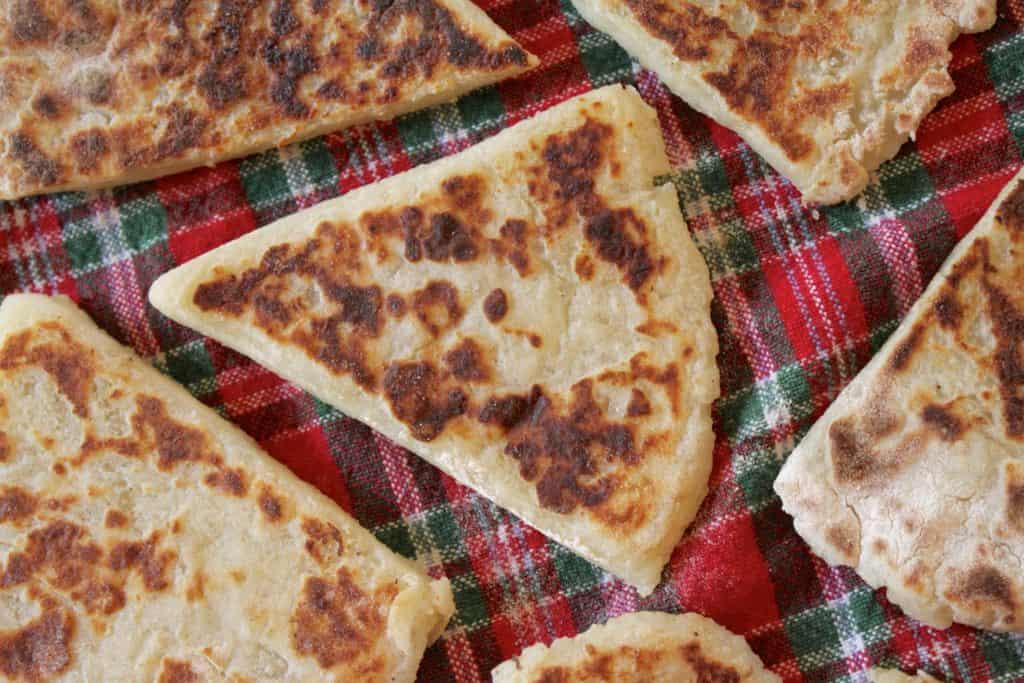
If you’ve gone to Britain, you will surely have experienced “the full British breakfast.” Depending on which part of the UK you’ve visited will determine what you see on your plate: in Scotland, you’ll surely see potato scones.
As an Amazon Associate I earn from qualifying purchases.

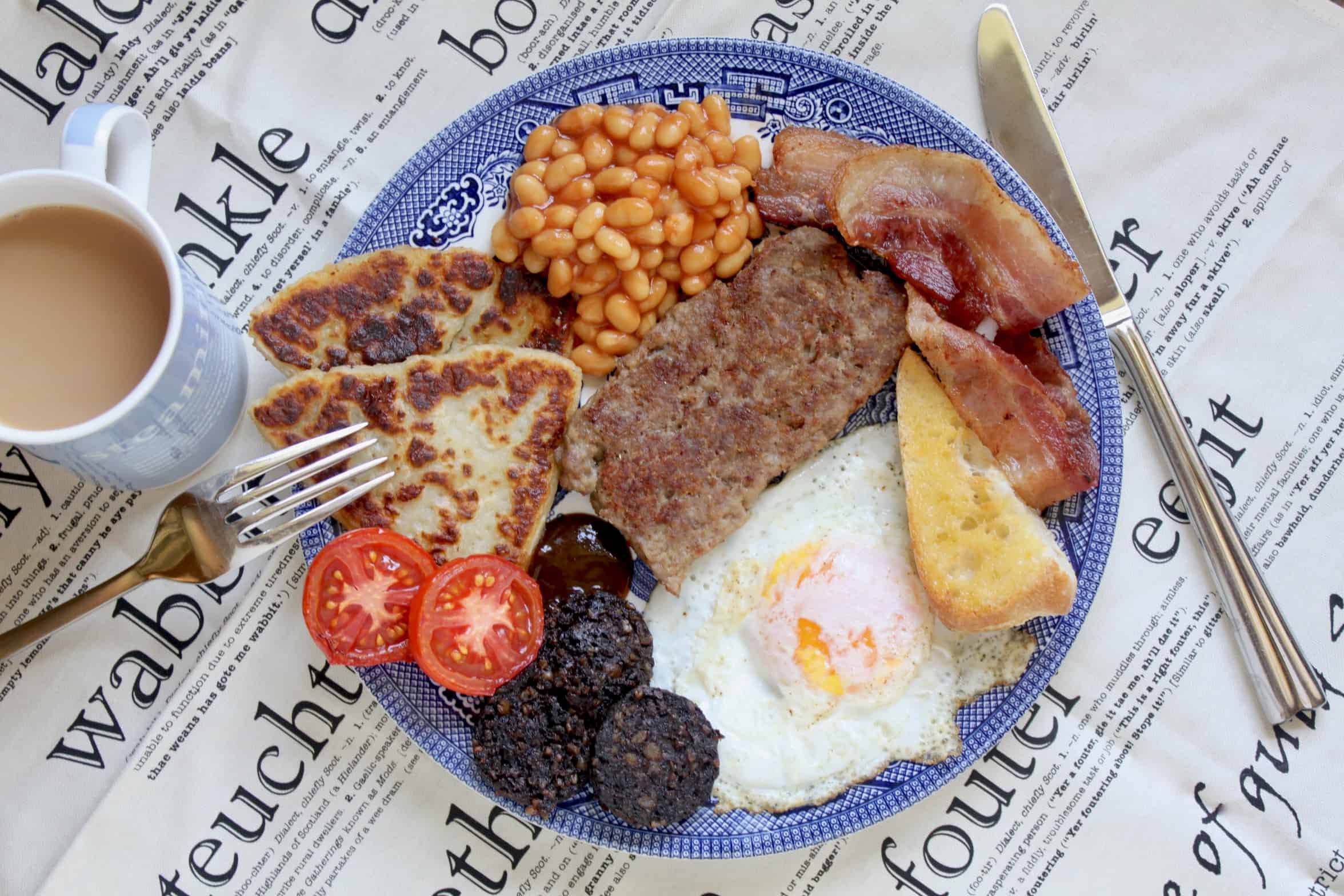
What is a British Breakfast?
It’s often called a “fry-up” because of the fact that almost everything is fried. It may also be called “heart attack on a plate,” but as long as you are not having this on a regular basis, it’s just too delicious to pass up once in a while!
Sometimes, you may hear the term, “a full English”, which refers to a full English breakfast. This means that all the options will be on your plate. Read on…
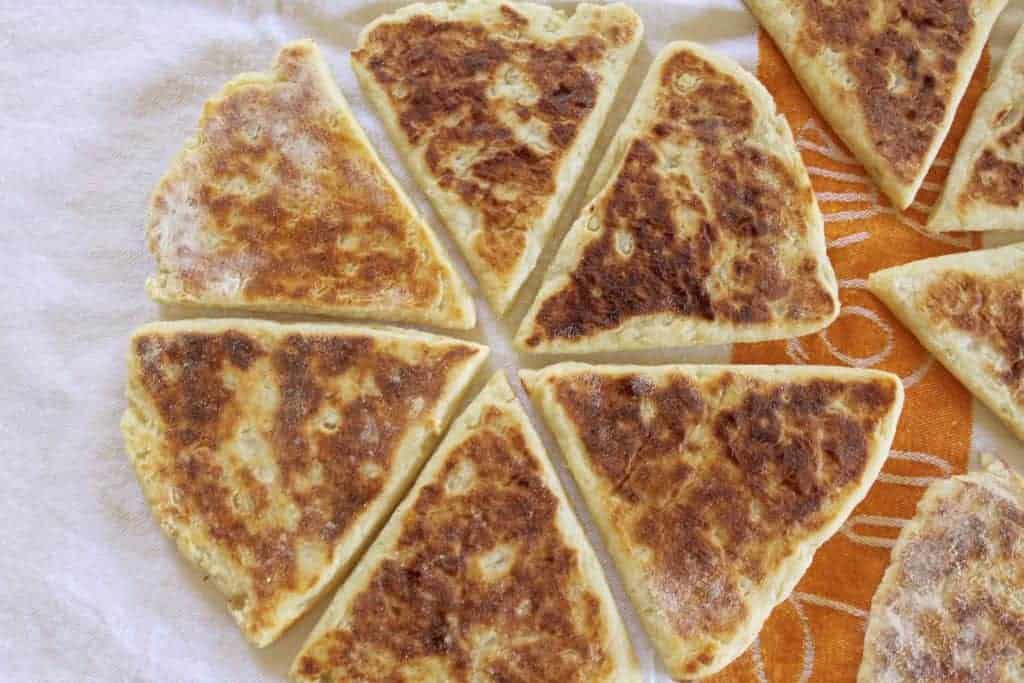
In Great Britain, breakfast will consist of several common items, such as eggs, bacon, tomato, toast and beans. The rest of the plate will be filled with different items, depending on the part of the country in which you are located.
English Breakfast
England offers their regional sausages and usually add mushrooms to the plate. Sometimes, black pudding is included in the options (usually more in the north of England, although the photo below is from London).
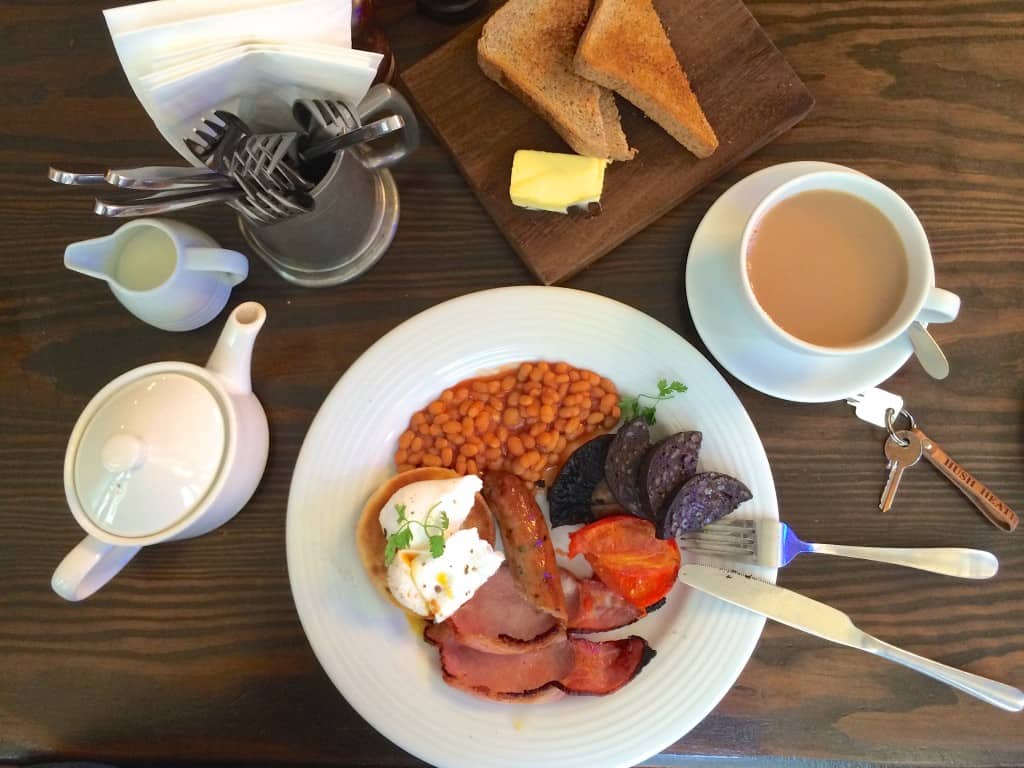
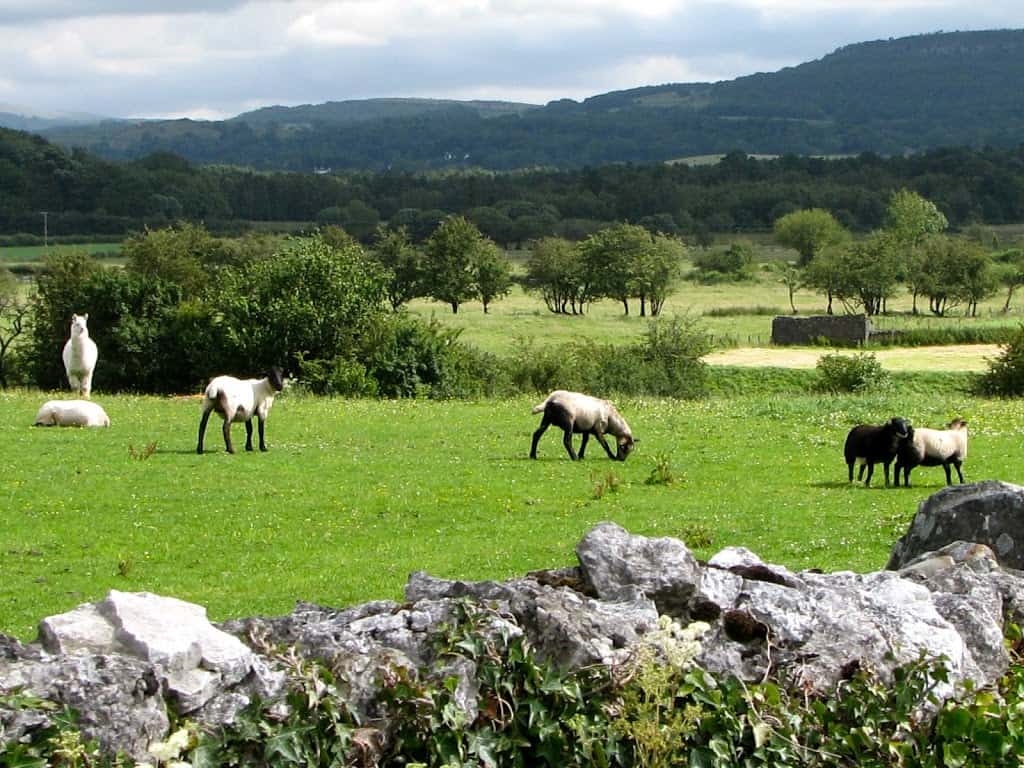
Irish Breakfast
Northern Ireland has their Ulster Fry with local sausages and soda scones. My dad was stationed in Ballymena when he was in the army (as a cook, no less) and has always raved about the soda scones. Ireland’s breakfasts are much the same and can include “potato farls” much like potato scones, and white and black pudding.
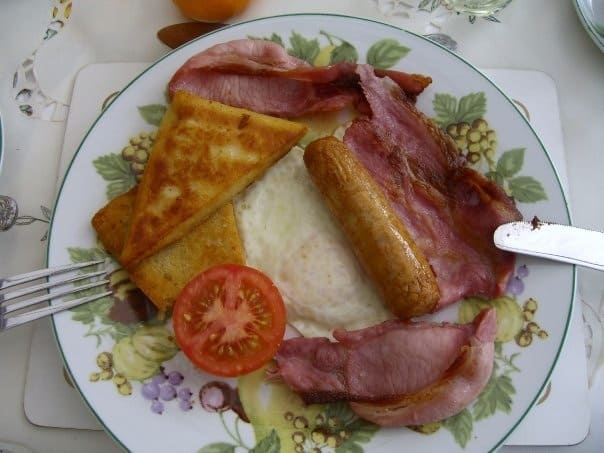
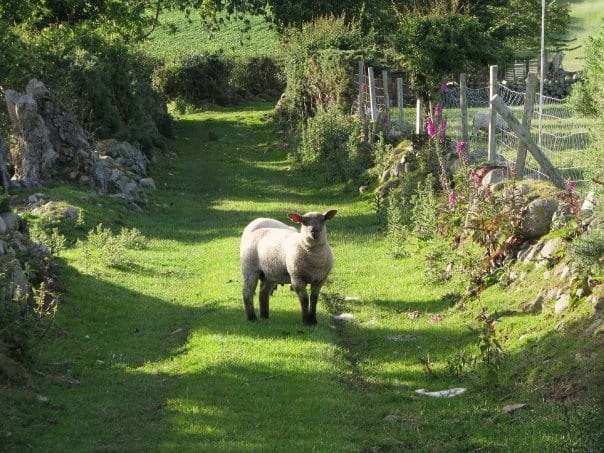
Welsh Breakfast
Although I’ve been to Wales, I’ve never had a typical Welsh breakfast (I do love Welsh cakes, though!) In addition to the basics of a British breakfast, the Welsh add laverbread (made from seaweed) and cockles on their breakfast plates. Have you tried this breakfast?
Another type of Scottish scone made on a griddle: girdle scones
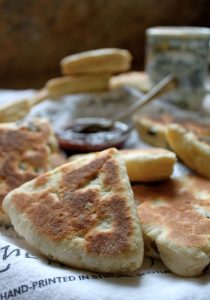
Scottish Breakfast
And last, but certainly not least, Scotland serves potato scones (also known as tattie scones), local sausages, and black and/or white puddings. I’m showing my bias here and saying that I think Scottish breakfasts are the best in Britain. This photo was taken at Rufflet’s, just outside St. Andrews.
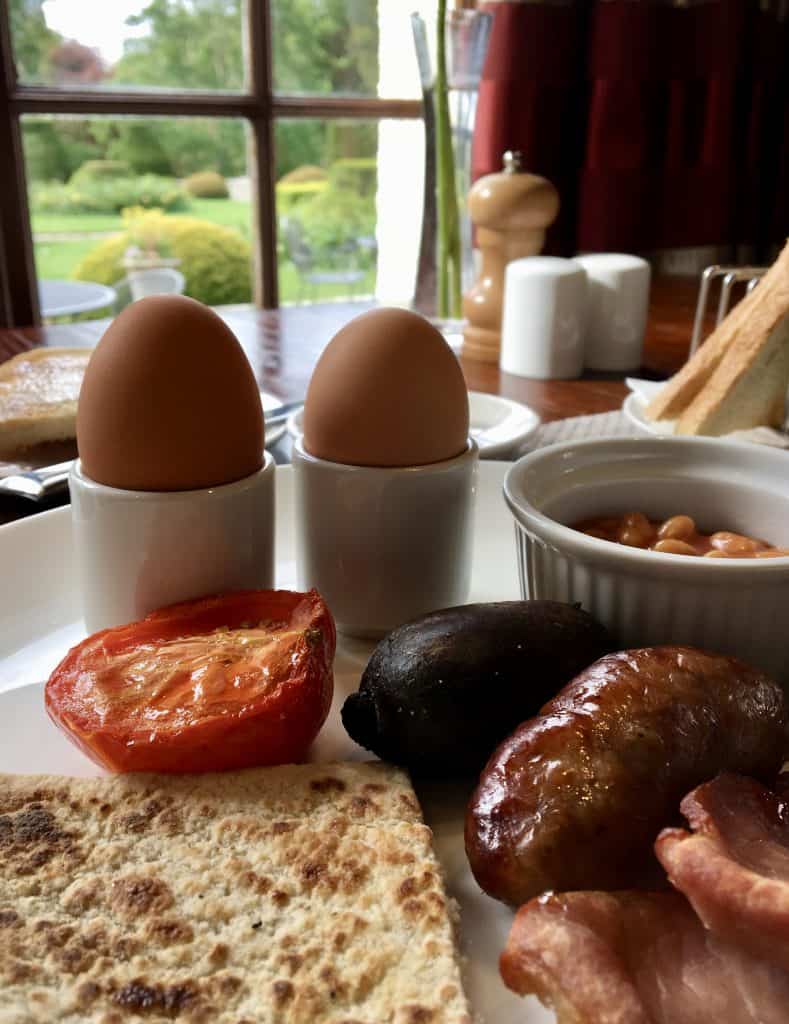

So now that we’ve decided on a Scottish breakfast (and that the Highland cow is the cutest!) I’m going to show you how to make delicious potato scones. Like so many of the recipes I make, they are quite simple to make and freeze well, so I usually make a double batch and freeze* most of them, so I can cook some whenever we want them.
As far as the black and white puddings go, I’ll leave that for you to decide if you want to try it (if you can find it where you live) as I ABSOLUTELY adore black pudding, but I understand if someone has not grown up with it, why they might have a less than positive feeling about it.
I was going to link to Wikipedia’s page on black pudding, but the first photo of black pudding isn’t the most appealing image that would encourage someone to try this tasty food!

Are Potato Scones the Same as Potato Cakes?
The answer to this question is yes, they are the same: potato scones are the Scottish name and potato cakes are the Irish name, but they are BOTH served as part of a savory meal, like breakfast. In addition, potato scones can also be eaten with butter (even jam) and served with a cup of tea.
How are Tattie Scones Made?
Potato scones are made from mixing boiled, riced (or mashed) potatoes, a little butter, salt, and flour. These ingredients are combined to form a dough, then rolled out, and cooked on a griddle. You may hear them called “tattie scones” in Scotland, but they are one and the same, and here’s how to make them.
*NOTE: you can use leftover mashed potatoes as long as they’re quite dry. It won’t work if you’ve added too much liquid.
You may also ask~
How do I Cook Potato Scones?
After being cooked on the griddle (no oil, butter or grease is added, so they are not fried), they can be eaten as is. However, as you’ve seen in the photos here, the best way to serve them is to fry them with the rest of your breakfast items (preferably after you’ve fried the bacon!) This way, they are crispy on the outside and soft in the middle.
Can I Freeze Potato Scones?
Absolutely yes, tattie scones are perfect for the freezer! I usually make a large batch and freeze all of them. They’re perfect to have on hand anytime you want a quick meal, just add eggs, if you like. To freeze: place them individually separated on a floured tray in the freezer until frozen, then place in a freezer bag. This way they won’t stick to each other. Alternately, you can put them in a container with pieces of wax/parchment paper in between them.
To cook frozen potato scones, there’s no need to defrost them, you can just fry them straight away. However, I usually take them out of the freezer about for about 10 minutes though, so they cook more quickly.

Scottish Potato Scones Recipe
(Tattie Scones)
From the Scottish Lofty Peak Recipe Book Serves 10 (2 each)
FULL PRINTABLE RECIPE BELOW
Ingredients
- russet potatoes
- flour
- butter
- sea salt
Special equipment: a potato ricer
Directions for Potato Scones
First, peel the boiled potatoes.
If you absolutely refuse to peel boiled potatoes, you can make your children do it peel them before boiling. You can use a potato ricer, if you have one. If not, just mash them, but what makes better potato scones is having light, dry potatoes, and ricing them gives them more air. To be honest, though, I don’t know anyone in Scotland who uses a ricer, haha!
Add the butter and salt. Taste the potatoes at this point, add more salt if needed, then very lightly mix in the sifted flour.
It will come together into a dough very quickly and easily. Turn out onto a floured workspace…
and gently fold over until smooth. Divide into 4 or 5 equal portions and form each into a ball. Roll one ball out to about 1/4″ thick, then prick with a fork and cut into quarters or sixths, whichever you prefer, with a large knife. Repeat with the rest of the balls of dough.
Heat a pan or griddle to (almost) high heat (between med. high and high.) I love my scraper for
picking up the scones to put into the pan.
Cook the Potato Scones
When the pan is hot, cook the scones until brown on each side. (You can cut them into round shapes with a cookie cutter, but this takes more time to rework the scraps of dough.)
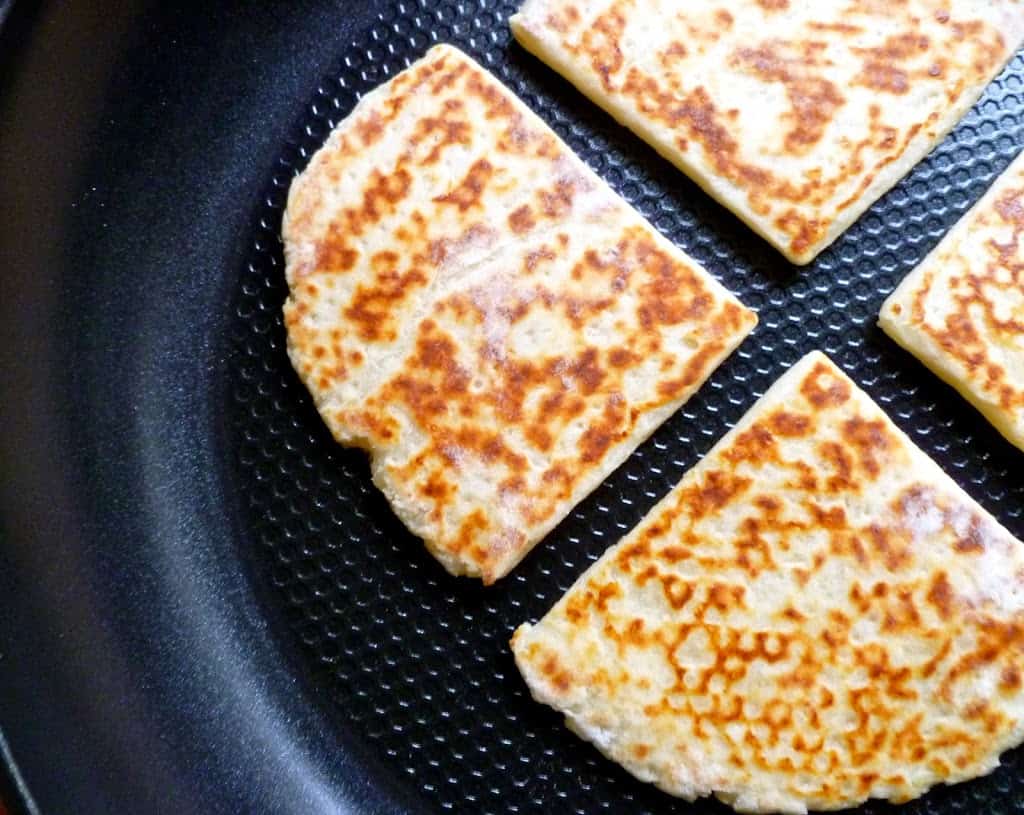
Place on a clean dish towel, then cover with the other half to cool.
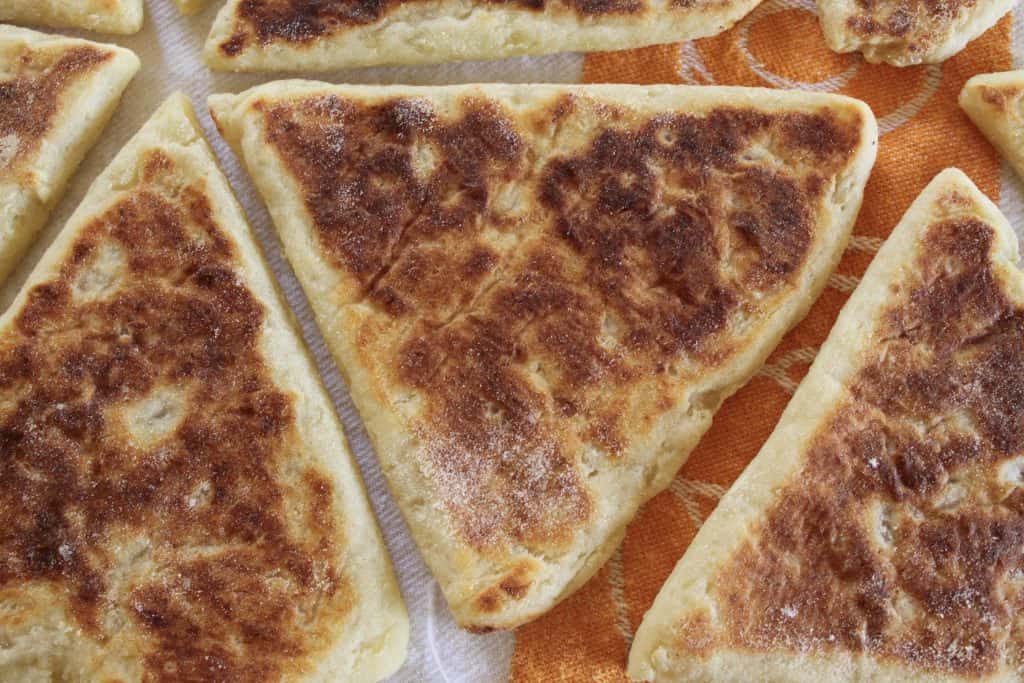
These are fully cooked and may be eaten as is, but traditionally, they are fried in the same pan as the bacon was fried in, for a Scottish breakfast.
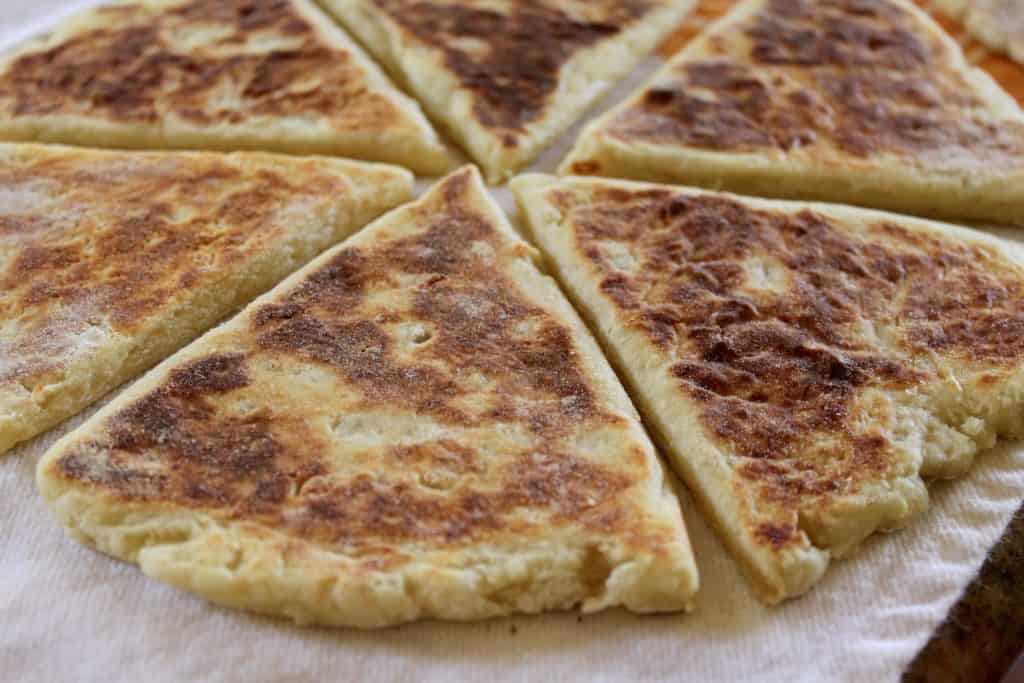
You can also toast them to heat them up, or even fry them with a tiny bit of light olive oil for a crispy, yet less artery-clogging breakfast :) You can also just have eggs, bacon and toast with potato scones, as I’ve done in the photo below.
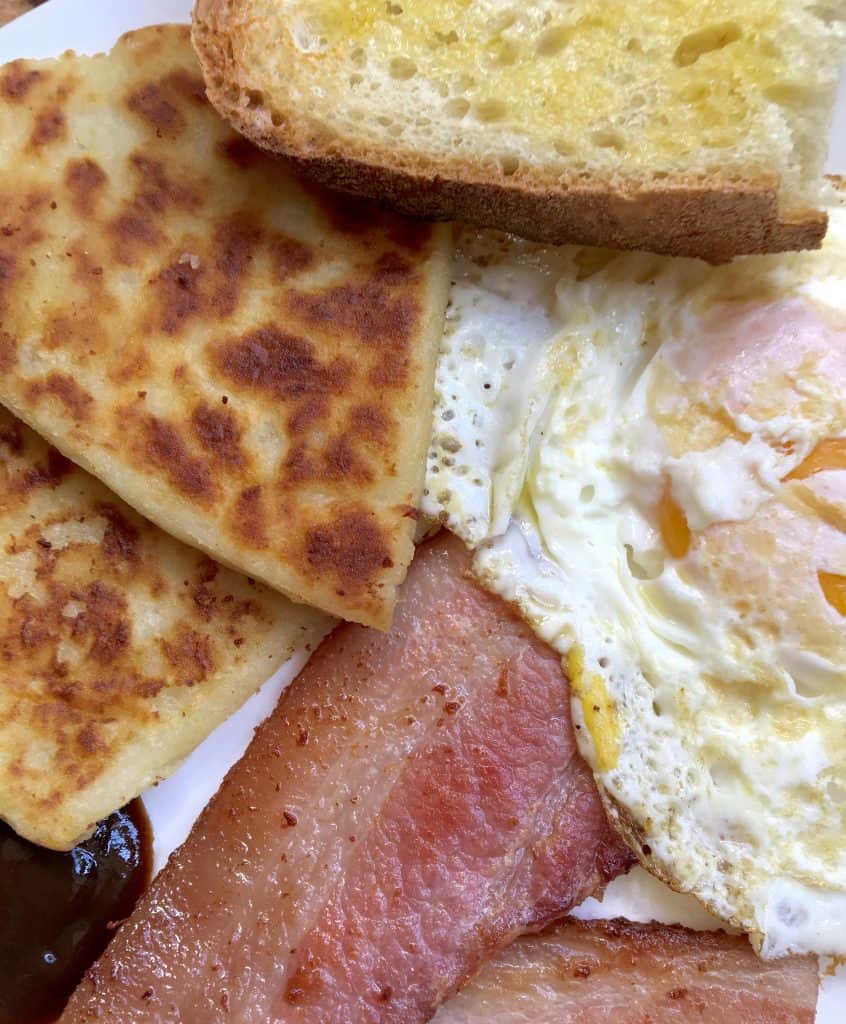
Or you can do it “right” and serve the potato scones with eggs, bacon, toast, black pudding (this one is really good), grilled tomato halves, sausages, Heinz Beans, HP Sauce a piping hot cup of tea. You can add any of the other delicious items you see in the photos above: delicious beyond words!
Oh, and did I mention you won’t be eating lunch or dinner that day? 😂
Leave a comment below if you agree that Scottish breakfasts are the BEST!!
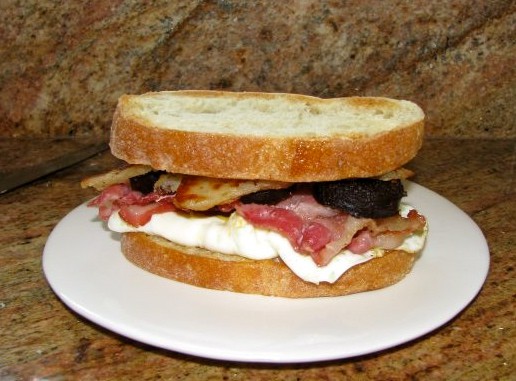
Don’t miss another post! Sign up for my free recipe & travel subscription.
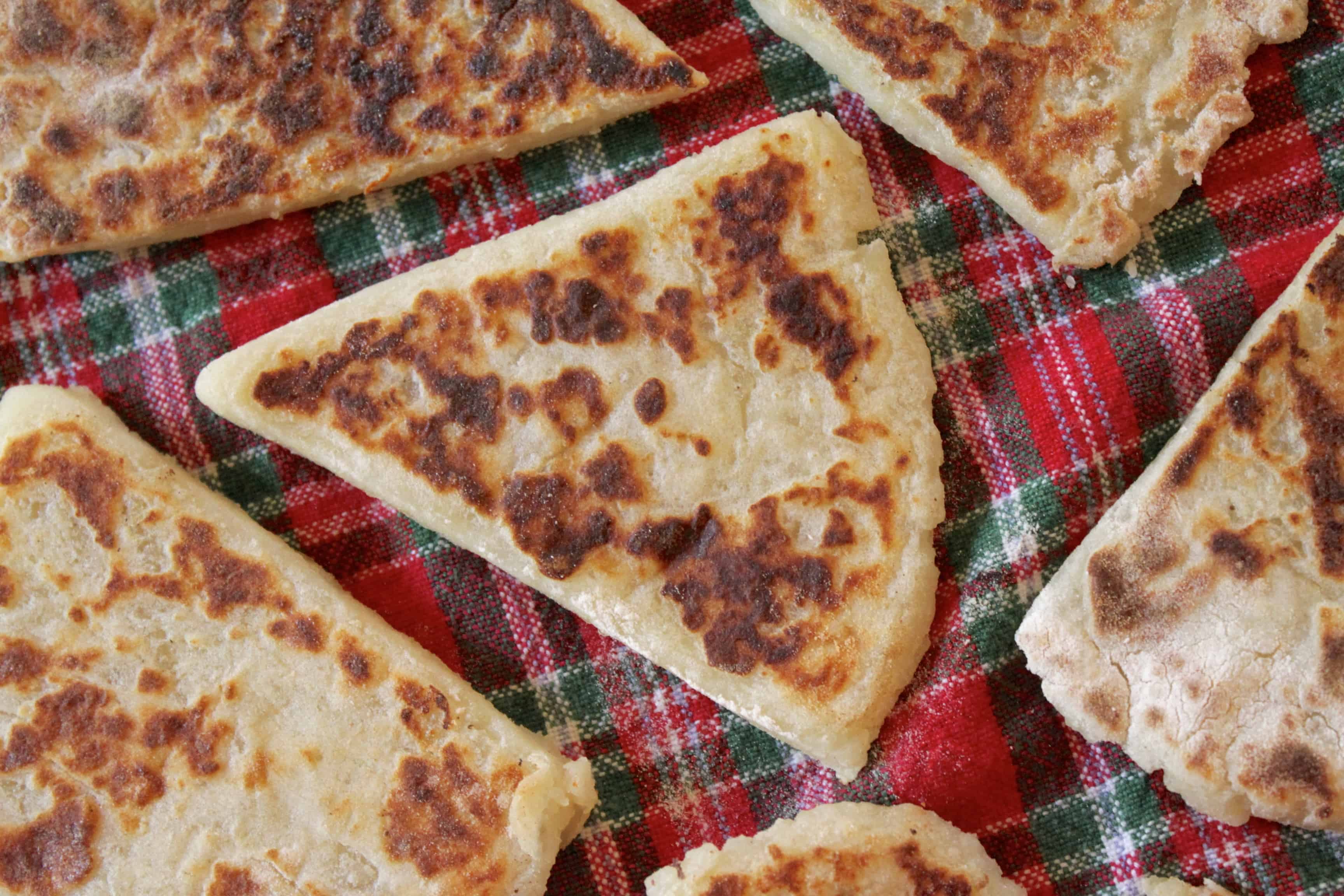
Scottish Potato Scones and British Breakfasts: a Tutorial
Ingredients
- 1 lb Russet potatoes boiled, see notes
- ½ cup flour sifted
- 2 tbsp butter softened, good quality
- ½ tsp Kosher salt or sea salt
Instructions
- First, peel the boiled potatoes. If you have a ricer, use it to rice the potatoes, if not, just mash them, but what makes better potato scones is light, dry potatoes, and ricing them gives them more air.
- Add the butter and salt. Taste the potatoes at this point, add more salt if needed, then very lightly mix in the sifted flour. It will come together into a dough very quickly and easily.
- Turn out onto a floured workspace and gently fold over until smooth. Divide into 4 or 5 equal portions and form each into a ball.
- Roll one ball out to about 1/4″ thick, then prick with a fork and cut into quarters or sixths, whichever you prefer, with a large knife. Repeat with the rest of the balls of dough.
- Heat a pan or griddle to (almost) high heat (between med. high and high.) When the pan is hot, cook the scones until brown on each side. Place on a clean dish towel, then cover with the other half to cool.
- These are fully cooked and may be eaten as is, but traditionally, they are fried in the same pan as the bacon was fried in, for a Scottish breakfast. I
Notes
- To freeze: place them individually separated on a floured tray in the freezer until frozen, then place in a freezer bag. This way they won't stick to each other. Alternately, you can put them in a container with pieces of wax/parchment paper in between them.
- Potatoes should be weighed after cooking - about 4 large potatoes, cooked in salted water -preferably cooked with the skin.
- To cook frozen potato scones, there's no need to defrost them, you can just fry them straight away. However, I usually take them out of the freezer about for about 10 minutes though, so they cook more quickly.
- If you absolutely refuse to peel boiled potatoes, you can peel them before boiling.
Nutrition
Christina’s Cucina is a participant in the Amazon Services LLC Associates Program, an affiliate advertising program designed to provide a means for sites to earn advertising fees by advertising and linking to Amazon.com.


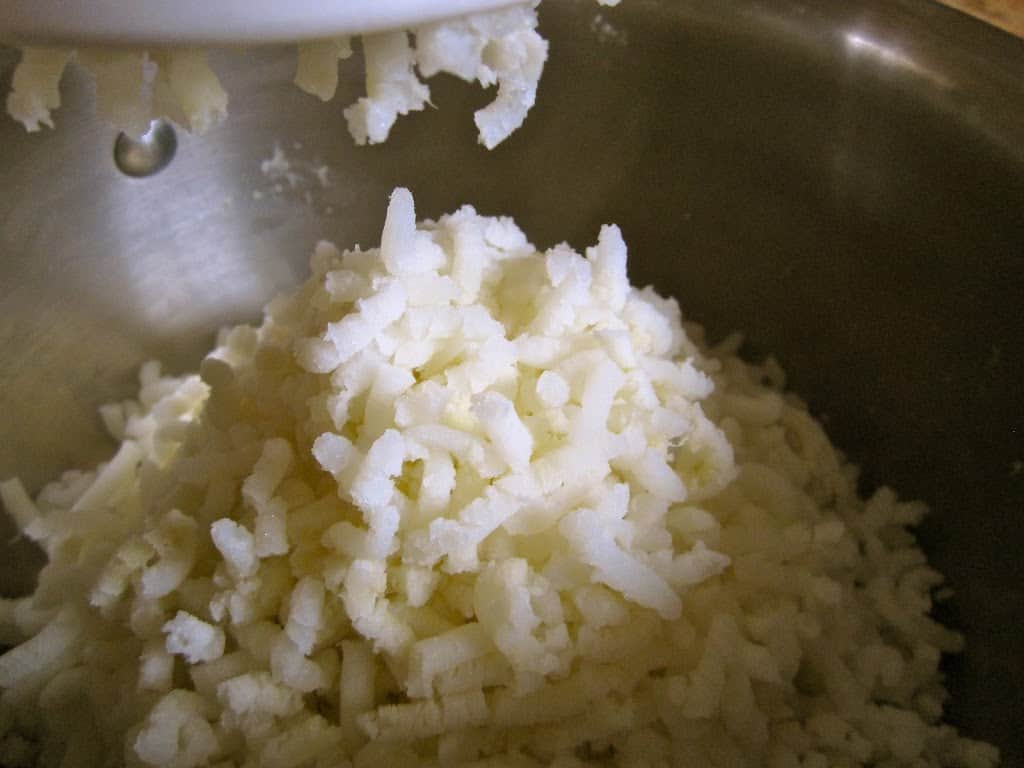

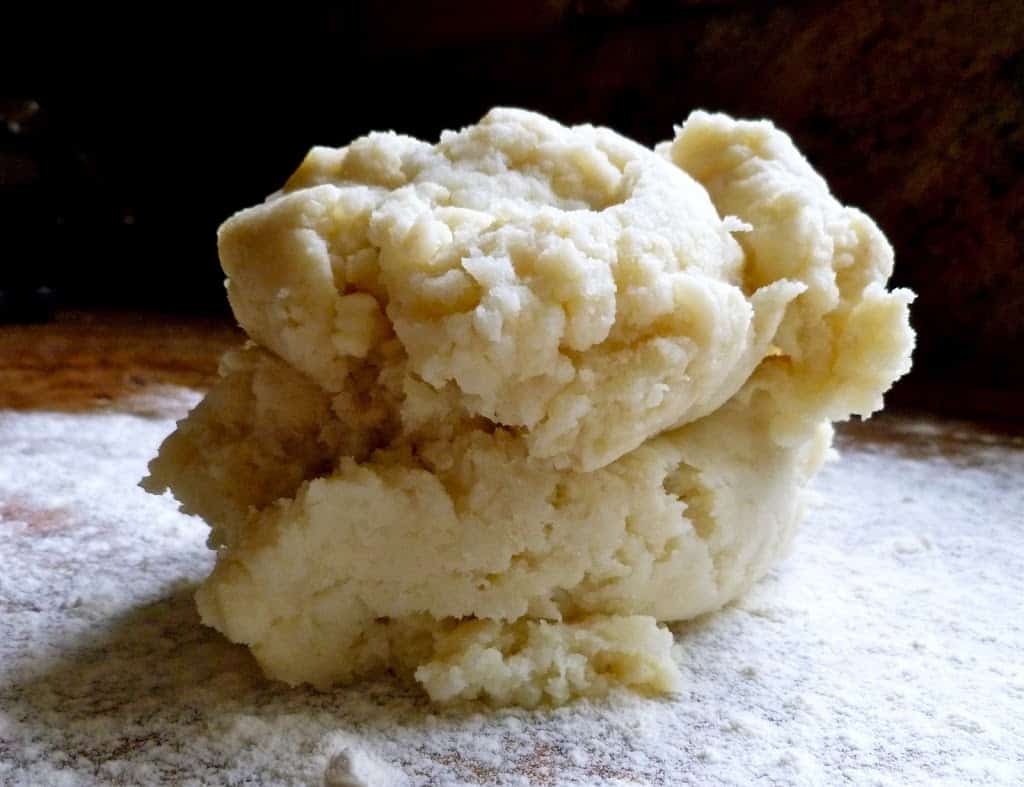
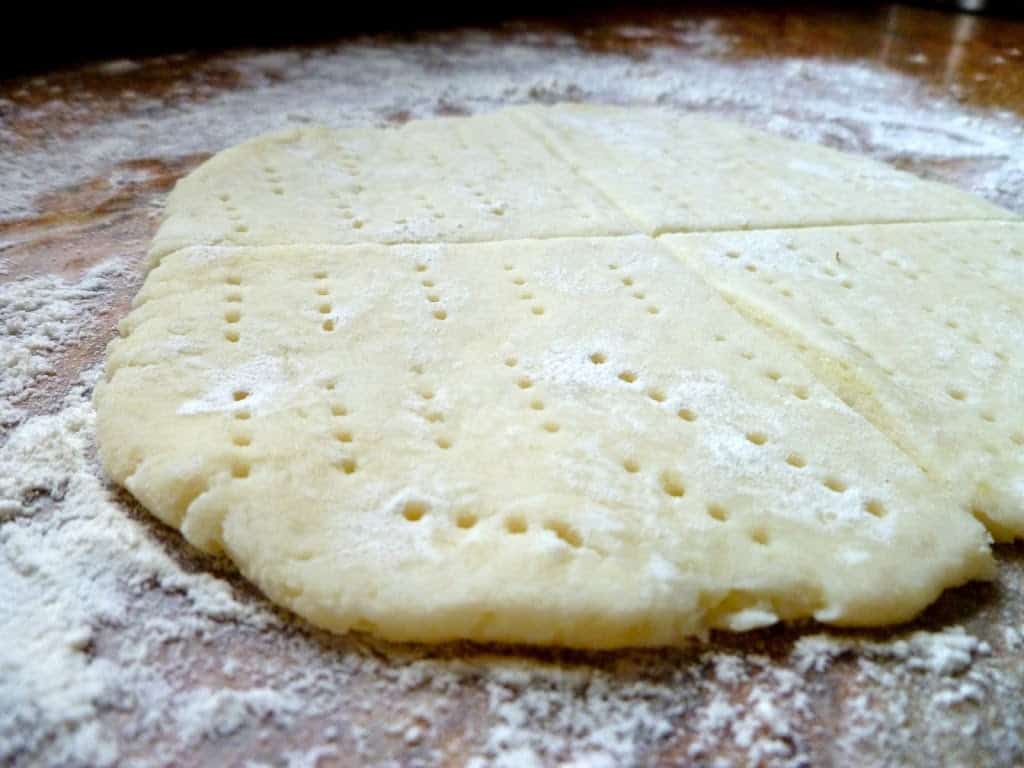
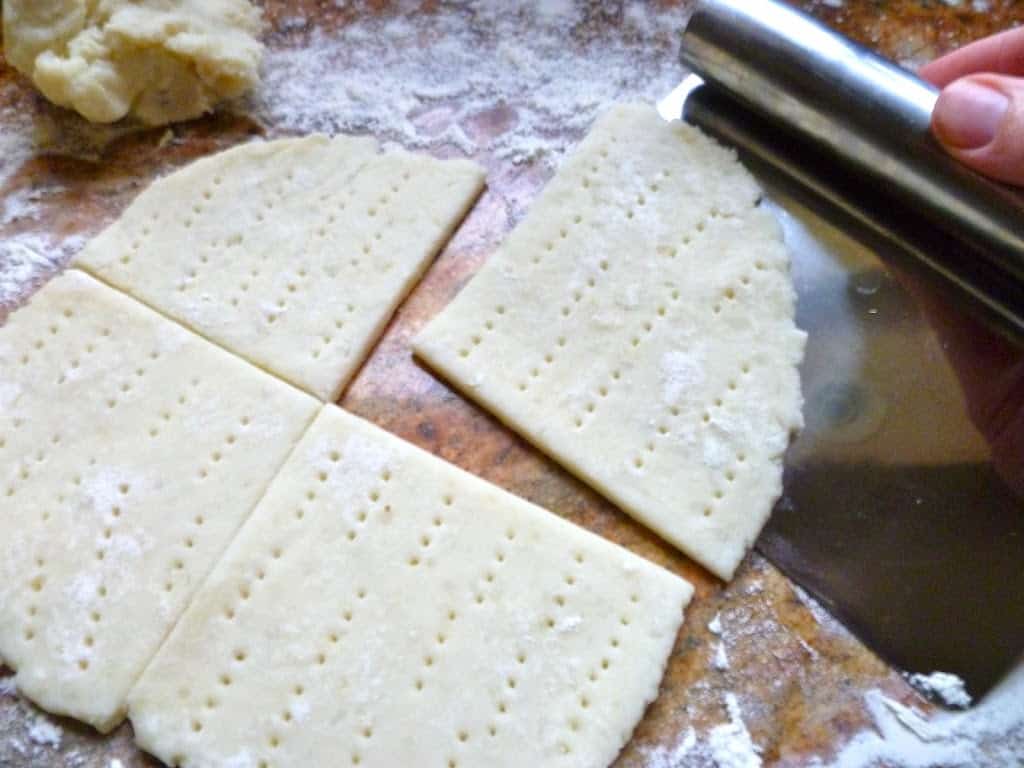
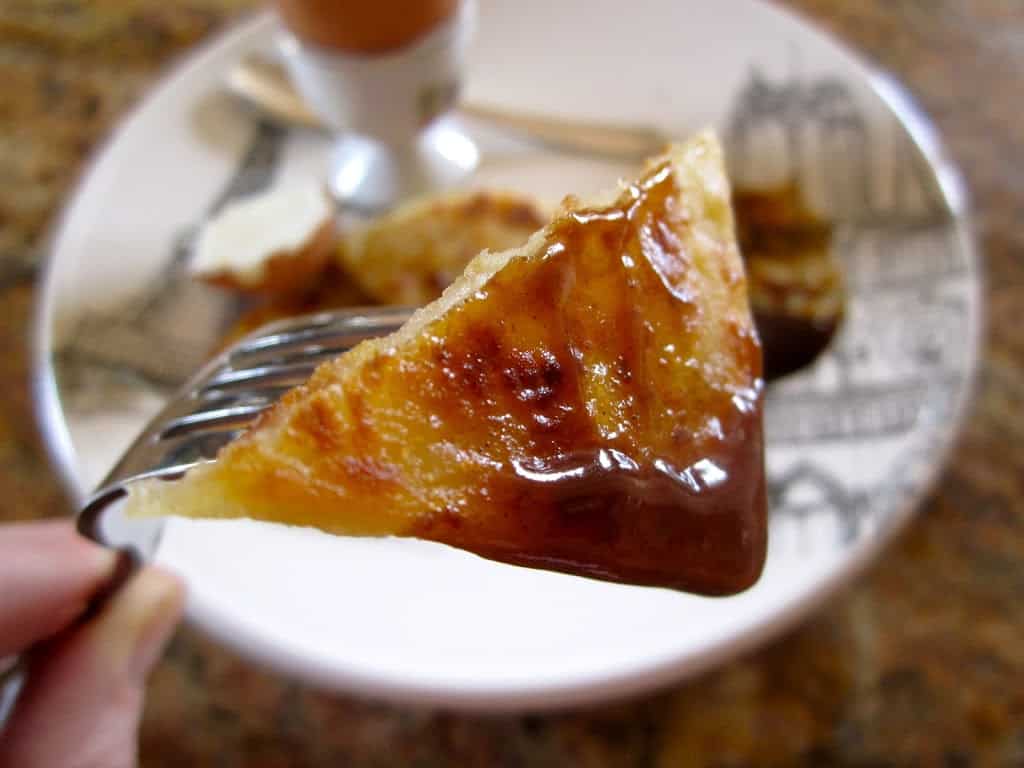
hi sorry for the silly question but do I cook these before freezing thank you and great recipe.
Hi Shirley, it’s not a silly question at all because they are actually cooked twice. You can prepare them as I’ve written the recipe, and then cool. Freeze individually and then place in a freezer bag or container (so they don’t all stick together.) Then you can defrost and fry up with bacon, eggs, and whatever else you’d like. Enjoy, they’re so good!
One of my very favorite discoveries, and I’m not sure why I even tried it: if you boil not-too-large potatoes (unpeeled), when you rice them (still unpeeled) a couple at a time, the skin gets left behind in the ricer!!! You do have to remove the skins from the ricer, but it’s easy peasy.
Thank you for the tatty scones recipe; looks so comforting, that whole breakfast. Well, maybe minus the black pudding.
My late mom used to make these. Quite often we would have them for supper with sausages. I think my grandmother used to make them too. She was from Blackpool. Can’t wait to give them a try.
That’s lovely to hear Linda! Let me know what you think!
I’ve tried all of the breakfasts mentioned, and indeed the feeble attempt of copying by the Aussies, never quite understanding why they turn their eggs over, but ,nothing beats a full Yorkshire breakfast. I confess to being bias, as I am a born and bred Yorkshire Tyke.